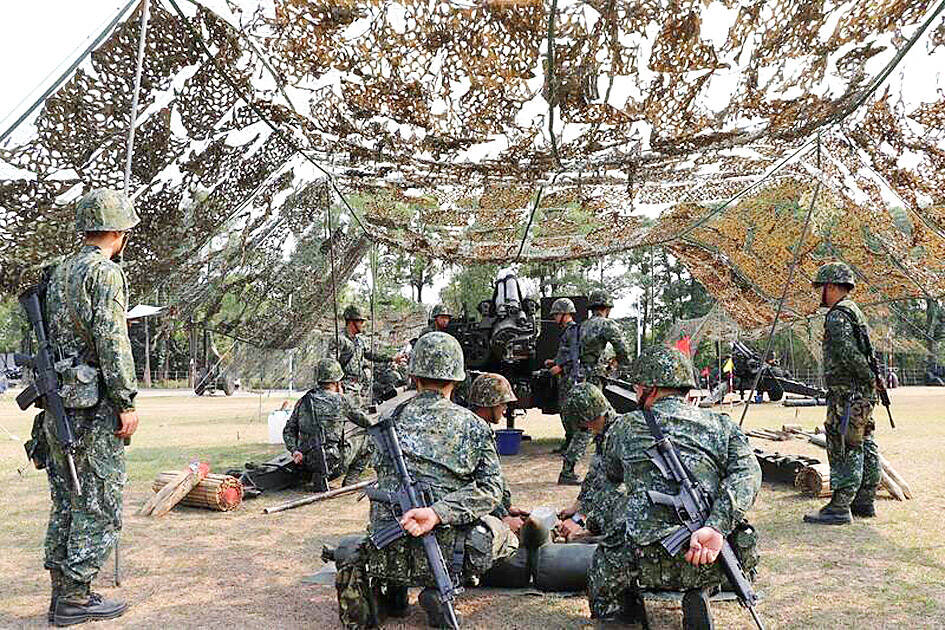Defense officials should address flaws in the military observed by US officials, Democratic Progressive Party (DPP) Legislator Wang Ting-yu (王定宇) said yesterday, after the Financial Times reported that a “low-key” delegation visited Taipei last month to assess the nation’s forces and the potential for closer cooperation.
The visiting US advisers found the Taiwanese military proficient at a tactical level, but lacking the ability to think strategically, the report said.
However, they assessed efforts to be on the right track.

Photo courtesy of the 8th Field Army
President Tsai Ing-wen (蔡英文) “has made the difficult and big move to tell the public things need to change and an all-of-society effort is needed to defend their homeland,” the Financial Times quoted a US official as saying. “There will be more progress from here.”
The report suggests that US-Taiwan joint military training and exchange programs are becoming more “open and normalized” with improving bilateral ties, Wang said.
Although Taiwan’s long-term national defense strategy emphasizing deep strikes and multilayered deterrence was adequate, the US delegates observed shortfalls in some capabilities, he said.
Citing an example, he said the armed forces were assessed as utilizing an obsolete model of command and control that needs to be flatter and more distributed, he added.
The armed forces should think about a strategy for maintaining the nation’s military edge, as China’s People’s Liberation Army has revamped its amphibious and airborne assault capabilities, Wang said.
An effective response would require new strategic concepts and military cooperation programs, he said, adding that the Ministry of National Defense and other national security agencies should take heed of the delegation’s assessment.
Meanwhile, a source familiar with the matter said that the defense ministry is mulling sending a military delegation to observe the US National Guard for reference in managing and instilling combat effectiveness in Taiwan’s reserve force.
Since Taiwan and the US inked a coast guard memorandum of understanding, bilateral cooperation in military and paramilitary affairs has surged to encompass training, tactics and combat skills, they said, describing the relationship as “present and ongoing.”
Taiwan sends many service members for training in the US, including F-16 pilots and regular army personnel, while special forces and marines are also involved, they said.
The All-Out Defense Mobilization Agency’s decision to appoint a colonel-rank liaison officer to head Taiwan reserve force-US national guard cooperation shows the program has become normalized, said Su Tzu-yun (蘇紫雲), a research fellow at the Institute of National Defense and Security Research.
Taiwan’s reserve force could benefit from collaborating with the US national guard and learning from the latter’s training, institution and culture, he said, adding that the two forces have similar responsibilities of territorial defense and disaster response.

CHAOS: Iranians took to the streets playing celebratory music after reports of Khamenei’s death on Saturday, while mourners also gathered in Tehran yesterday Iranian Supreme Leader Ayatollah Ali Khamenei was killed in a major attack on Iran launched by Israel and the US, throwing the future of the Islamic republic into doubt and raising the risk of regional instability. Iranian state television and the state-run IRNA news agency announced the 86-year-old’s death early yesterday. US President Donald Trump said it gave Iranians their “greatest chance” to “take back” their country. The announcements came after a joint US and Israeli aerial bombardment that targeted Iranian military and governmental sites. Trump said the “heavy and pinpoint bombing” would continue through the week or as long

TRUST: The KMT said it respected the US’ timing and considerations, and hoped it would continue to honor its commitments to helping Taiwan bolster its defenses and deterrence US President Donald Trump is delaying a multibillion-dollar arms sale to Taiwan to ensure his visit to Beijing is successful, a New York Times report said. The weapons sales package has stalled in the US Department of State, the report said, citing US officials it did not identify. The White House has told agencies not to push forward ahead of Trump’s meeting with Chinese President Xi Jinping (習近平), it said. The two last month held a phone call to discuss trade and geopolitical flashpoints ahead of the summit. Xi raised the Taiwan issue and urged the US to handle arms sales to

BIG SPENDERS: Foreign investors bought the most Taiwan equities since 2005, signaling confidence that an AI boom would continue to benefit chipmakers Taiwan Semiconductor Manufacturing Co’s (TSMC, 台積電) market capitalization swelled to US$2 trillion for the first time following a 4.25 percent rally in its American depositary receipts (ADR) overnight, putting the world’s biggest contract chipmaker sixth on the list of the world’s biggest companies by market capitalization, just behind Amazon.com Inc. The site CompaniesMarketcap.com ranked TSMC ahead of Saudi Aramco and Meta Platforms Inc. The Taiwanese company’s ADRs on Tuesday surged to US$385.75 on the New York Stock Exchange, as strong demand for artificial intelligence (AI) applications led to chip supply constraints and boost revenue growth to record-breaking levels. Each TSMC ADR represents

State-run CPC Corp, Taiwan (CPC, 台灣中油) yesterday said that it had confirmed on Saturday night with its liquefied natural gas (LNG) and crude oil suppliers that shipments are proceeding as scheduled and that domestic supplies remain unaffected. The CPC yesterday announced the gasoline and diesel prices will rise by NT$0.2 and NT$0.4 per liter, respectively, starting Monday, citing Middle East tensions and blizzards in the eastern United States. CPC also iterated it has been reducing the proportion of crude oil imports from the Middle East and diversifying its supply sources in the past few years in response to geopolitical risks, expanding